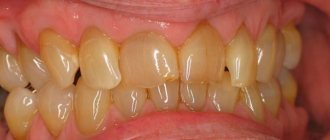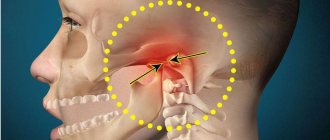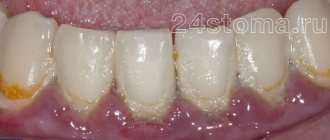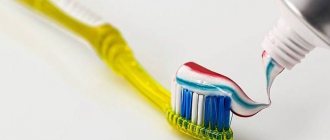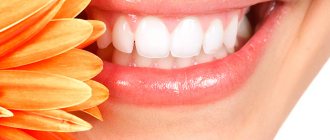From this article you will learn:
- what is hyperesthesia,
- causes and provoking factors,
- treatment of dental hypersensitivity.
Increased sensitivity of teeth is a condition in which, in response to various temperature, chemical and mechanical stimuli, short-term pain occurs in the teeth. As a rule, pain occurs in response to cold water or air, to sour, sweet or salty foods, as well as in response to the touch of the bristles of a toothbrush to the necks of the teeth. The intensity of the pain syndrome can range from mild discomfort to severe pain, which prevents you from eating or brushing your teeth.
In dentistry, the terms “hypersensitivity” or “dental hyperesthesia” are also used to refer to this condition. Human teeth are prone to hypersensitivity due to several factors. One of the main factors is the process of demineralization of tooth enamel, i.e. when, as a result of calcium being washed out of it, the surface layer of enamel becomes less dense. Usually this process occurs in the area of the necks of the teeth, where the enamel is already quite thin.
Another factor causing the development of hyperesthesia is the thinning of tooth enamel. Its thickness may decrease as a result of abrasion, or as a result of the formation of wedge-shaped defects in the area of the necks of the teeth. When tooth enamel becomes thinner or less dense, irritants begin to act through the tooth enamel on dentin, which consists of dentinal tubes with fluid circulating through it. When exposed to irritants, the speed of fluid movement in the tubes increases, which leads to irritation of the nerve endings present in them and the occurrence of pain.
Causes of high tooth sensitivity
Sensitive teeth
Modern dentistry distinguishes several classifications, and in the first place are carious lesions of the enamel and similar diseases:
- Medium and deep caries are irreversible destruction of the upper layers of dentin.
- Pulpitis is a complication of neglected or incompletely cured caries.
- Periodontitis and periodontal disease - due to extensive inflammation, the sensitivity of the enamel increases several times.
Non-carious factors include:
- Bruxism and malocclusion – with age, due to improper jaw position, the enamel becomes very thin.
- Wedge-shaped defect - destruction in the cervical area sooner or later leads to discomfort and aching pain.
- Demineralization due to poor nutrition, hormonal imbalance in the first trimester of pregnancy or old age.
- Chips, cracks and other tooth injuries.
In addition, there is a non-dental group of reasons:
- Serious diseases of the gastrointestinal tract.
- Endocrine disorders and diabetes mellitus.
- Bad habits – alcohol abuse and smoking.
High sensitivity can be local, when an individual tooth suffers, or generalized, in which the entire jaw needs diagnosis.
How does pain appear when a tooth reacts to cold?
The main symptom of the disease is hypersensitivity. Teeth begin to react specifically to contact with cold: with short, severe pain. Even breathing in cold air becomes painful. Contact with the same triggers causes discomfort and pain. Sometimes the pain subsides for a while, but happens again when irritating factors arise.
The pain can be very severe. Eating and using a toothbrush becomes painful. A person has to limit himself to warm food. It is no longer possible to eat anything too cold or too hot. The pain can be so severe that, depending on the level of individual tolerance, the reaction to it can be quite pronounced.
In addition, the consequence of the disease is the thinning of hard tissues.
Hypersensitivity affects not only one, but often several teeth at once, standing next to each other. The more of them are damaged, the deeper and longer the patient’s suffering.
The reaction to cold has a number of causes. Scientists have identified the main patterns of the pathogenesis of the disease, thanks to modern high technologies. Its connection with the appearance of areas devoid of dentin was revealed. Hard tissues are exposed due to caries, periodontal disease, non-carious manifestations: damage to the enamel layer, hypoplasia and other defects.
Dentin serves as a covering for the enamel at the crown line. The tooth root is protected by a fairly thin layer of cementum. It is permeated with the finest channels. Their number and size in diameter determine the course of hyperesthesia: with it, these indicators are often higher than normal.
New and enlarged dentinal tubules increase blood flow within the tubules. These changes lead to pain. All liquids enter the microscopic pores of the enamel coating, which has a direct connection with the tubules. The enamel pores dry out, become thinner or enlarge. As a result, the reaction of odontoblast processes increases. Its consequence is pain.
Types of dental hypersensitivity
Causes of sensitive teeth
Today, patients often experience enamel sensitivity after whitening, both independently and in the dentist's office. To ensure that the aesthetic procedure does not cause discomfort, you need to remember important points:
- Whitening toothpaste has an abrasive effect, and it is not recommended to use it more than 2 times a week.
- Laser whitening and the ZOOM 4 machine are relatively safe methods, but they use a gel with carbamide peroxide, which often causes irritation.
- Kits with whitening compounds should be selected based on the jaw cast. If this is not possible, it is better to buy thermoplastic mouthguards.
Another case is sensitivity after installing a filling. At this point, the tooth “removes” after an anesthetic injection, and pain for 48 hours is normal. To minimize discomfort, the first two days you need to:
- Avoid hot tea and coffee.
- Avoid chewing gum and sweets.
- Chew food thoroughly, preferably without solids.
Enamel hypersensitivity in early pregnancy is associated with intoxication and hormonal changes in the female body. Here it is important to consult a dentist in time and consider a course of restorative therapy.
Reasons for the manifestation of anxiety symptoms
Hypersensitivity (hyperesthesia) is what dentists call increased excitability of hard dental tissues. With this disease, a person experiences not only discomfort, but also pain, which greatly complicates everyday life and interferes with enjoying simple joys.
Such deviations are usually the result of a number of specific factors:
- excessively intensive cleaning, too much pressure on the brush;
- an abundance of harmful bacteria in the oral cavity, which leads to the formation of plaque;
- various dental diseases: increased abrasion of the enamel layer, malocclusion, caries, inflammatory process, severe periodontitis, etc.;
- use of unsuitable products for regular oral hygiene: abrasive pastes, hygiene instruments with hard bristles;
- frequent whitening;
- long-term use of antibiotics and other drugs that affect teeth;
- poor nutrition, lack of necessary vitamins and microelements in the diet;
- harmful tendencies (tobacco smoking, constant habit of gnawing nuts and seeds);
- addiction to salty, sour and spicy foods (citrus fruits, orange juice, carbonated drinks), which destroys the enamel and makes it porous;
- hormonal imbalances;
- grinding and mechanical damage;
- old or defective fillings.
It’s worth remembering all of the above reasons when figuring out what to do if you have high tooth sensitivity and how to relieve discomfort at home.
Consequences of the whitening procedure
Quite often, hyperesthesia is a consequence of whitening procedures. Most patients report discomfort that occurs almost immediately. It is noteworthy that this happens not only as a result of inept actions at home, but also after the provision of services by qualified specialists.
Of course, if cleansing is carried out in the Dentiki dental office, the risk of hypersensitivity is minimized. After all, our doctors know well which cleaning method will be most suitable for the client. In addition, he first eliminates all existing problems in the oral cavity, and only then begins whitening. Afterwards, the doctor must carry out procedures to strengthen the weakened enamel layer.
Those who decide to whiten their teeth at home are at much greater risk. Incorrectly selected abrasive products, if used incorrectly, lead to mechanical injuries and destruction of enamel. And of course, few people think that before using whitening compounds it is necessary to eliminate any pathological manifestations in the mouth.
When reviewing information online on how to get rid of tooth sensitivity and reduce discomfort at home, it is important to understand that even when the procedure is performed by a specialist, negative manifestations cannot be completely excluded. In any case, the enamel layer becomes porous, the dentinal tubules open, which leads to unpleasant and even painful sensations. To calm pain and eliminate other symptoms, dentists recommend using special restorative and strengthening agents. They normalize the mineral composition of the enamel and saturate it with fluoride.
If you want whitening to be as safe as possible and to avoid hypersensitivity after it, follow a few rules:
- It is better to entrust the procedure to a professional.
- When planning to whiten teeth at home, use only specialized products recommended by your dentist. Do not overuse abrasive pastes.
- First get rid of any dental pathologies and put your oral cavity in order.
- Carry out manipulations aimed at strengthening the enamel layer at least 2 weeks before cleaning. Spend the same amount of time recovering after.
As a result of filling
When trying to find out what helps with tooth sensitivity, how to relieve and how to reduce discomfort, you should remember that hyperesthesia often makes itself felt immediately after visiting the dentist’s office. And it’s not just about whitening anymore. Discomfort may also occur when the patient has had a filling installed. Don't worry - this is normal. With the condition that gradually the unpleasant symptom weakens, and after about 7-10 days it disappears completely.
Hypersensitivity can also be a consequence of depulpation. This is how dental tissues and the oral cavity as a whole react to therapeutic manipulations and medications used. At the same time, if unpleasant sensations continue to disturb you for a long period of time, a medical error cannot be ruled out. This situation is a serious reason to visit the dentist’s office again and tell him about your problem.
During pregnancy
This is by far the most beautiful moment in every woman’s life is associated with numerous difficulties. In particular, representatives of the fair sex who are carrying a fetus often exhibit hyperesthesia. This happens as a result of increased stress on the body, hormonal imbalances, metabolic disorders and decreased immunity.
While studying available materials, how to soothe sensitive teeth and what to do at home, know that you cannot ignore alarming manifestations. Getting rid of pain and discomfort on your own is very difficult and often unsafe. Especially considering the position of the expectant mother. When pathology is discovered during pregnancy, you must immediately contact a specialist. Only an experienced dentist will be able to prescribe appropriate therapy and a course of health procedures.
Ideally, the condition of dental elements should be taken care of at the stage of maternity planning. Accustom yourself to preventive procedures, eat right, and don’t be afraid to visit the dental office once again. It is necessary to introduce into the diet foods enriched with vitamins C and D, magnesium and calcium.
As a reaction to hot and cold
This is the first sign of hypersensitivity. The range of sensations in this case can be different, from sharp, bright pain in one point, which quickly disappears, to a prolonged pain syndrome of a weak nature in several at once. Manifestations can be caused by minor thinning of the enamel layer or more serious pathological processes. This is why you should not put off going to the doctor. Only a professional will be able to understand the problem and recommend effective methods for eliminating hyperesthesia. If a pathology is discovered, the doctor will carry out appropriate treatment, and he will decide what to do and how to treat highly sensitive teeth only after examining the patient.
How to treat tooth sensitivity?
If the patient does not have caries or other pathologies, then enamel hyperesthesia is treated with an in-office remineralization procedure. It goes like this:
- The doctor removes accumulated plaque and tartar using ultrasound or an Air Flow device.
- The surface of the teeth is thoroughly dried and coated with a remineralizing composition.
- After 20-30 minutes, the remaining gel is cleaned off, and to improve the effect, a special varnish based on sodium fluoride is applied to the enamel.
The office procedure may not be enough, and then the doctor prescribes an additional course, which includes:
- Applications with Remodent suspension 3-4 times a day for 15 minutes.
- Applying Fluocal gel after morning brushing.
- Rinse with compositions containing 10% calcium gluconate.
A number of drugs “take root” better with the help of physiotherapy. Electrophoresis has proven itself well, when the active substance is attached to the gum on an electrode and catalyzed by microcurrents. This method will give additional tone and improve blood circulation.
Consequences of treatment at the dentist
The following types of interventions are performed in dentistry:
- mechanical (removing tartar, polishing fillings, etc.);
- thermal (photopolymerization of fillings);
- chemical (bleaching, acid treatment of enamel, etc.).
After going to the dentist, pain as a reaction to medical procedures often occurs. Tooth preparation followed by filling sometimes causes a reaction to cold and hot. It is necessary to follow doctors' instructions regarding oral care. Hyperesthesia must be treated! It is advisable not to delay this. Because it will be followed by the development of complications.
Damaged teeth require mandatory filling. This process does not always completely eliminate pain. An unpleasant result of such treatment is increased tooth sensitivity. Dental units with fillings give a painful reaction when eating cold food or liquids. This means that the therapy caused complications. You need to treat the problem carefully. You have to look for the cause at the dentist. When the oral cavity contains teeth that have not lost their nerves, they are primarily susceptible to damage and react to changes in temperature.
What to do if you lose tooth enamel?
The problem is not always solved by remineralization and dental varnish. In cases where the enamel is worn out or severely cracked, gentle methods will not help. Modern dentistry offers several solutions with complete or partial preservation of the tooth:
- Veneers and lumineers are the most expensive method; they provide good protection, but do not restore chewing functions.
- Ceramic or zirconium crowns are strong and durable. Requires preliminary preparation of the support.
- Artistic restoration - new generation composite materials are practically indistinguishable from the natural shade, but last a maximum of 10 years.
What complications may arise?
- gums bleed and ache;
- jaw tissue atrophies;
- psycho-neurological diseases appear, worsen and progress;
- the endocrine system is subject to disorders;
- diseases of the stomach and intestines occur;
- Negative changes begin in the central nervous system (poor sleep, stress, irritability, etc.);
- sensitivity to air makes communication with others problematic;
- social activity decreases;
- there is difficulty in career growth;
- slowdown in self-development;
- there is no opportunity, as usual, to eat well;
- inflammation of the nerve endings in the dental cavity occurs (pulpitis).
A set of measures related to getting rid of hypersensitivity to irritation, carried out on time, guarantees a complete irreversible solution to these dental problems.
Prevention of tooth sensitivity
To preserve tooth enamel, just follow simple rules:
- Do not chew nut shells or similar hard foods.
- Chew food on both sides of the jaw alternately.
- Reduce the consumption of spicy, sour, salty and sweet foods in favor of fresh vegetables and fruits.
- Whiten your teeth no more than once a year.
- Avoid frequent injuries, falls and blows to the jaw area if you play contact sports.
- Treat caries and gum inflammation in a timely manner.
- Visit the dentist for a preventive examination at least 2 times a year.
Why do teeth become sensitive?
Common causes of hypersensitivity:
Firstly, this is the abuse of whitening pastes. The fact is that such pastes contain silicon elements, which are designed to remove yellowed or darkened areas of enamel. Gradually, as a result of proper brushing, the tooth becomes whiter. But if you brush more often than the doctor prescribed or for a longer time, then the beneficial beauty properties of the paste become detrimental to tooth enamel and destroy calcium. As a result, the tooth “weakens” and begins to react painfully to irritants.
Secondly, it is the frequent consumption of foods that contain a lot of acid. These types of food include lemon, garlic, cucumber, yogurt, whey, pepper, avocado and many others. High acid content gradually leaches calcium from tooth enamel. Therefore, refrain from frequently consuming such foods, but rather, go for a check-up with a doctor and consult about your diet.
Thirdly, these are the consequences of mechanical damage to teeth. Injuries can occur during fights, at work, due to carelessness or negligence, during sports or service. Part of the tooth or filling breaks off, affecting the root and gums. This causes swelling, inflammation, or loosening of the tooth. As a result, when chewing food, a person feels discomfort.
Fourthly, this is periodontitis. The disease is characterized by inflammation of the soft tissues, which leads to the gradual separation of the tooth from the bone parts. The tooth gradually becomes loose and begins to cause discomfort to the person while eating. One of the hallmarks of periodontitis is bleeding gums. It is recommended to consult a doctor as soon as the first symptoms are noticed.
Fifthly, incorrect treatment. After a poor-quality filling, the tooth becomes sensitive if the doctor did his job improperly. During the treatment, the doctor may loosen the root or damage the enamel. As a result, the tooth begins to react painfully to irritants.
What is hyperesthesia?
Increased sensitivity of teeth is a disease that affects the neck of the tooth and its root. This happens due to thinning of tooth enamel or due to gum pathologies with dentin opening.
Most often, increased sensitivity of teeth is observed in older people, but it is incorrect to consider it a problem of the older generation. It has been established that family history is important.
The main cause of hypersensitivity is thinning of the enamel and erasing of the gums. These processes occur slowly and unnoticed by humans. Therefore, if you notice that your gums are moving away from your teeth, you need to contact a specialist as soon as possible. Otherwise, the pathology will only progress.
Non-systemic reasons
- Exposure to food acids. They are rich in citrus fruits, cabbage of various varieties, radishes, sweet carbonated waters;
- Non-carious lesions of hard dental tissues. Enamel wears off quickly, especially if not properly cared for;
- Development of caries. It provokes erosion of dental tissues or wedge-shaped effects (V-shaped flaw);
- Mechanical tooth destruction. Occurs during strong impacts, bleaching, grinding for subsequent installation of crowns;
- Inflammation of soft dental tissues (pulpitis). The reason is the penetration of infections, mainly bacterial.
Types of hypersensitivity
The type of sensitivity depends on the location of the problem. Divided:
- Generalized. All or most teeth are affected. This is usually associated with a global problem such as pathological abrasion, periodontal disease and others.
- Localized. One or more teeth become sensitive. This can occur due to a violation of the integrity of the enamel, improper installation of the crown, or wedge-shaped defects.
The tooth may have visible defects - carious cavities, erosion, chips. If there is no visible damage, the sensitivity is most likely caused by chronic diseases.
Preventive measures
Prevention is preferable to treatment. To prevent such an unpleasant symptom as dental hypersensitivity from bothering you, just do the following:
- Introduce foods rich in vitamins C and D, magnesium, calcium and phosphorus into your diet.
- Strengthen your immune system.
- Avoid foods that contain a lot of acid.
- To brush your teeth, use soft-bristled toothbrushes and preventive toothpastes.
- Do not use whitening pastes.
- Remove tartar at the dentist regularly, avoiding large deposits.
Diagnostics
If a patient complains of tooth sensitivity to cold, hot, sweet and sour foods, the doctor may immediately suspect hyperesthesia. The disease can be diagnosed after a visual examination of the patient's oral cavity. During the examination, the doctor may note changes in the structure of the hard tissues of the tooth, as well as changes in the condition of the periodontium. Usually there is a decrease in hard tissue at the cutting edge (front teeth) or on the chewing surface (back teeth).
Differential diagnosis of hyperesthesia lies in the ability to distinguish the symptoms of tooth sensitivity from the symptoms of acute pulpitis. In acute pulpitis, pain is prolonged, pain occurs mainly at night. With hyperesthesia, the pain is short-term, occurs directly from chemical or thermal irritation of the tooth and goes away almost immediately.
